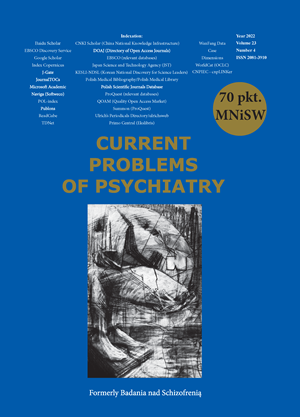Health Consciousness vs. Disease. Polish Adaptation of the HealthConsciousness Scale by Ch.S.Hu
DOI:
https://doi.org/10.2478/cpp-2022-0019Keywords:
psychometric properties, reliability, validityAbstract
Introduction: Health consciousness is a theoretical construct that, depending on the concept, constitutes a psychological structure expressed primarily in the cognitive and behavioural sphere. It determines how individuals respond to health issues and the extent to which they are ready to take action to improve them. The level of health consciousness in the patient and his/her family has an impact on the achieved therapeutic effects. Due to the lack of an analogous tool for testing health consciousness in the Polish literature on this subject, the research objective was to create a Polish adaptation of the Ch.S.Hu Health Consciousness Scale and determine its psychometric properties.
Material and methods: The study covered 599 people. Out of their group, a sample (N=291) was randomly drawn in order to conduct an exploratory factor analysis and determine the level of the reliability of the tool. The model was verified by a confirmatory factor analysis (N=599). HCS validity measures were based on the analysis of intergroup differences and correlations between selected variables.
Results: The Polish version received a five-factor structure, containing 24 items. Both the entire scale and almost all subscales have a very high reliability coefficient (α=0.80). Medical professionals/persons with medical education achieve significantly higher results in HCS than other respondents.
Conclusions: Conclusions. The Polish version of HCS has very good psychometric properties. This means that the tool is reliable and accurate. It can be used in both scientific research and individual diagnosis.
References
1. Skiba W, Siwicki D. Deinstytucjonalizacja psychiatrii w Polsce – dwie ścieżki, jeden cel. Analiza porównawcza założeń i pierwszych etapów wdrożenia modeli psychiatrii środowiskowej. Wrocław: Uniwersytet Wrocławski; 2021.
2. Chondros P, Styliandis S, Lavdas M. User and Family Participation in Mental Health Services. In: Styliandis S, editor. Social and Community Psychiatry. Towards a Critical, Patient-Oriented Approach, Cham: Springer International Publishing; 2016, p. 437-49. https://doi.org/10.1007/978-3-319-28616-7_22
3. Podgórska-Jachnik D, Pietras T. Praca socjalna z osobami z zaburzeniami psychicznymi i ich rodzinami. Warszawa: Centrum Rozwoju Zasobów Ludzkich; 2014.
4. Thornicroft G, Deb T, Henderson C. Community mental health care worldwide: current status and further developments. World J Psychiatry 2016;15:276-86. https://doi.org/10.1002/wps.20349.
5. World Health Organization. Mental health : facing the challenges, building solutions : report from the WHO European Ministerial Conference. World Health Organization, Regional Office for Europe; 2005.
6. Becker MH, Maiman LA, Kirscht JP, Haefner DP, Drachman RH. The Health Belief Model and Prediction of Dietary Compliance: A Field Experiment. J Health Soc Behav 1977;18:348. https://doi.org/10.2307/2955344.
7. Gaweł A. Świadomość zdrowotna jako kategoria wyznaczająca cele edukacji Zdrowotnej. In: Gaweł A, Bieszczad B, editors. Kategorie pojęciowe edukacji w przestrzeni interdyscyplinarnych interpretacji, Kraków: UJ; 2011, p. 83-99.
8. Iversen AC, Kraft P. Does socio-economic status and health consciousness influence how women respond to health related messages in media? Health Educ Res 2006;21:601-10. https://doi.org/10.1093/her/cyl014.
9. Ratajczak Z. Model zachowania się człowieka wobec własnego zdrowia. Wnioski dla praktyki promocyjnej,. In: Ratajczak Z, editor. Promocja zdrowia. Psychologiczne podstawy wdrożeń, Katowice: Uniwersytet Śląski; 1997.
10. Zhang J, Sun L, Khan A. A review and assessment of the existing health consciousness models. Int Manag Rev 2014;1:17-23.
11. Gould SJ. Health Consciousness and Health Behavior: The Application of a New Health Consciousness Scale. Am J Prev Med 1990;6:228-37. https://doi.org/10.1016/S0749-3797(18)31009-2.
12. Gould SJ. Consumer Attitudes Toward Health and Health Care: A Differential Perspective. J Consum Aff 1988;22:96-118. https://doi.org/10.1111/j.1745-6606.1988.tb00215.x.
13. Hong H. Scale Development for Measuring Health Consciousness: Re-conceptualization. In: Yamamura K, editor. 12th Annual International Public Relations Research Conference: Research That Matters to the Practice, Florida, FL, USA, Miami: University of Miami; 2009, p. 212-33.
14. Dutta-Bergman MJ. Primary sources of health information: Comparisons in the domain of health attitudes, health cognitions, and health behaviors. Health Commun 2004;16:273-88. https://doi.org/10.1207/S15327027HC1603_1.
15. Dutta-Bergman MJ. An Alternative Approach to Social Capital: Exploring the Linkage Between Health Consciousness and Community Participation. Health Commun 2004;16:393-409. https://doi.org/10.1207/s15327027hc1604_1.
16. Kraft F, Goodell PW. Identifying the health conscious consumer. J Health Care Mark 1993;13:18-25.
17. Łukasik I. Health consciousness as a real phenomenon in view of John R. Searle’s considerations. Presence of the term in health pedagogy. Lubelski Rocznik Pedagogiczny 2020;39:11-21. https://doi.org/10.17951/lrp.2020.39.4.11-21.
18. Garcia D, Skillman GD, Dvorak RD. Spirituality, environmental consciousness, and health awareness and use of complementary and alternative medicine. Adv Mind Body Med 2012;25:8-12.
19. Hu CS. A New Measure for Health Consciousness : Development of A Health Consciousness Conceptual Model. National Communication Association 99th Annual Convention, Washington, DC, 2013.
20. Gaweł A. Refleksje wokół tożsamości naukowej pedagogiki zdrowia. In: Łączka T, editor. Pedagogika zdrowia w teorii i praktyce, Kielce: UJK; 2017, p. 15-28.
21. Gaweł A. Pedagodzy wobec wartości zdrowia. Kraków: Wydawnictwo Uniwersytetu Jagiellońskiego; 2003.
22. Łukasik IM. Budowanie świadomości zdrowotnej w orientacji na przyszłość wyzwaniem edukacji zdrowotnej. Lubelski Rocznik Pedagogiczny 2019;37:93. https://doi.org/10.17951/lrp.2018.37.4.93-106.
23. Prochaska JO, DiClemente CC. Stages and processes of self-change of smoking: toward an integrative model of change. J Consult Clin Psychol 1983;51:390-5. https://doi.org/10.1037/0022-006x.51.3.390.
Downloads
Published
Issue
Section
License
Copyright (c) 2022 Authors

This work is licensed under a Creative Commons Attribution 4.0 International License.


